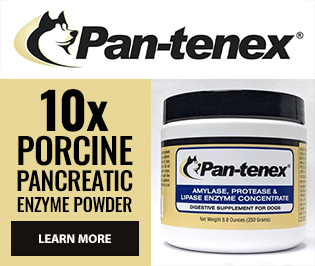When your dog has digestive issues, the two most commonly recommended supplements are digestive enzymes and probiotics. Both offer support for the gut, but they work in very different ways. Knowing the difference can help you make the best choice for your dog’s specific needs.
What Are Digestive Enzymes?
Digestive enzymes are naturally produced by the pancreas and help break down food into nutrients your dog can absorb. There are three main types:
- Protease – breaks down proteins
- Lipase – breaks down fats
- Amylase – breaks down carbohydrates
Some dogs don’t produce enough of these enzymes on their own, which can result in maldigestion. In these cases, supplementing with a high-potency enzyme powder like Pan-tenex may help improve nutrient absorption, reduce stool volume, and support healthy weight.
What Are Probiotics?
Probiotics are beneficial bacteria that live in your dog’s intestines. They help balance the gut microbiome, support immune health, and defend against harmful bacteria. Probiotics are often used after antibiotics, during stressful events, or when dogs experience loose stool or general digestive upset.
Unlike enzymes, probiotics don’t assist with digestion directly, but they do help maintain a healthier gut environment.
Which Should You Choose for Your Dog?
It depends on your dog’s symptoms. Consider the following:
- If your dog has loose stool or inconsistent bowel movements, probiotics may offer relief.
- If your dog produces large or greasy stools, has excess gas, or seems constantly hungry, digestive enzymes may be the better option.
- If your dog shows multiple signs of digestive imbalance, using both enzymes and probiotics together may provide more complete support.
Can They Be Used Together?
Yes, many dog owners choose to use both digestive enzymes and probiotics as part of their dog’s daily care routine. Enzymes help break down food so the body can absorb nutrients more effectively, while probiotics promote a healthy gut lining and microbial balance.
When starting both, it’s a good idea to introduce one supplement at a time and monitor for any changes in digestion or stool consistency. Our Dog Enzyme Digestive Health Stool Tracker is a great tool to help you track changes and progress.
Final Thoughts
Digestive enzymes and probiotics both offer powerful digestive support but serve different purposes. If your dog has signs of poor digestion, adding a high-potency enzyme like Pan-tenex may be a key step toward improving their digestion. If your dog’s issues are more related to gut sensitivity or stress, probiotics might help restore balance.
For more feeding and supplement tips, explore our other Help Articles or reach out with any questions.

